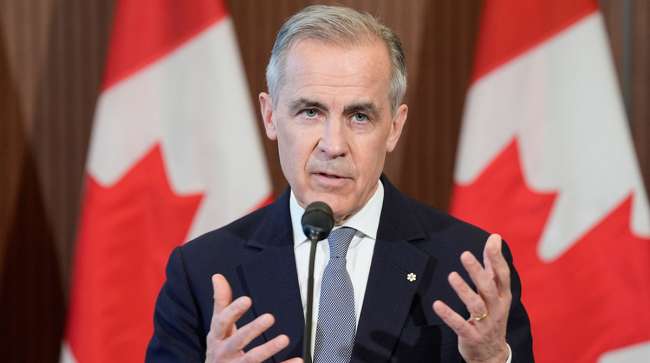Canada Prime Minister Mark Carney speaks with media in Ottawa on March 27. He announced a six-month tariff exemption for some items. (Adrian Wyld/The Canadian Press via Associated Press)
Canada has effectively suspended almost all of its retaliatory tariffs on U.S. products, tamping down inflation risks and improving its growth outlook, according to Oxford Economics.
The government imposed new import taxes of 25% on about C$60 billion ($43 billion) of U.S.-made goods in March in response to the first round of tariffs from the Trump administration. Canada also retaliated against U.S. auto tariffs in early April by putting its own levies on U.S. vehicles.
But Prime Minister Mark Carney’s government then announced a six-month tariff exemption for products used in Canadian manufacturing, processing and food and beverage packaging, and for items related to health care, public safety and national security. Automakers got a break, too: companies that manufacture in Canada, such as General Motors Co., are allowed to import some vehicles into Canada tariff-free.
Those exemptions mean Canada’s tariff-rate increase on the U.S. is “nearly zero,” according to calculations by Oxford.

BrightDrop electric vans at the General Motors CAMI Assembly Plant in Ingersoll, Ontario. (Brett Gundlock/Bloomberg)
“It’s a very strategic approach from a new prime minister to really say, ‘We’re not going to have a retaliation,’ ” Tony Stillo, Oxford’s director of Canada economics, said in an interview. “It’s a strategic play on the government’s part to not damage the Canadian economy.”
Retaliatory tariffs on some U.S. goods remain, including on food items such as orange juice, alcohol and coffee, as well as clothing and cosmetics.
Carney fought and won an election last month by convincing millions of Canadian voters that he was the best candidate to handle a trade war with the U.S., which buys about three-quarters of Canada’s exports.
The prime minister said Canada will have to strengthen its own domestic economy — partly through government-backed infrastructure and housing initiatives — and seek out new trade and security alliances with other countries. But he’s also made it clear that he doesn’t necessarily endorse “dollar for dollar” retaliation, which former Prime Minister Justin Trudeau said he supported in “principle.”
A spokesperson for Finance Minister Francois-Philippe Champagne, whose department is responsible for administering the tariffs, did not reply to a request for comment on the Oxford report.
Oxford still sees the Canadian economy slipping into recession this year, but it upgraded its growth forecast to 0.9% for this year and 0.3% next year. Government spending should soften the blow of the trade war, the firm said. It’s forecasting that the rate of inflation will briefly rise to 3% in 2026, but should quickly ease.






